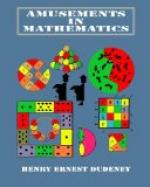Here, then, is a puzzle: In how many different ways may nineteen shillings and ninepence be paid in our current coin? Remember that the fourpenny-piece is not now current.
33.—Puzzle in reversals.
Most people know that if you take any sum of money in pounds, shillings, and pence, in which the number of pounds (less than L12) exceeds that of the pence, reverse it (calling the pounds pence and the pence pounds), find the difference, then reverse and add this difference, the result is always L12, 18s. 11d. But if we omit the condition, “less than L12,” and allow nought to represent shillings or pence—(1) What is the lowest amount to which the rule will not apply? (2) What is the highest amount to which it will apply? Of course, when reversing such a sum as L14, 15s. 3d. it may be written L3, 16s. 2d., which is the same as L3, 15s. 14d.
34.—The grocer and draper.
A country “grocer and draper” had two rival assistants, who prided themselves on their rapidity in serving customers. The young man on the grocery side could weigh up two one-pound parcels of sugar per minute, while the drapery assistant could cut three one-yard lengths of cloth in the same time. Their employer, one slack day, set them a race, giving the grocer a barrel of sugar and telling him to weigh up forty-eight one-pound parcels of sugar While the draper divided a roll of forty-eight yards of cloth into yard pieces. The two men were interrupted together by customers for nine minutes, but the draper was disturbed seventeen times as long as the grocer. What was the result of the race?
35.—Judkins’s cattle.
Hiram B. Judkins, a cattle-dealer of Texas, had five droves of animals, consisting of oxen, pigs, and sheep, with the same number of animals in each drove. One morning he sold all that he had to eight dealers. Each dealer bought the same number of animals, paying seventeen dollars for each ox, four dollars for each pig, and two dollars for each sheep; and Hiram received in all three hundred and one dollars. What is the greatest number of animals he could have had? And how many would there be of each kind?
36.—Buying apples.
As the purchase of apples in small quantities has always presented considerable difficulties, I think it well to offer a few remarks on this subject. We all know the story of the smart boy who, on being told by the old woman that she was selling her apples at four for threepence, said: “Let me see! Four for threepence; that’s three for twopence, two for a penny, one for nothing—I’ll take one!”
There are similar cases of perplexity. For example, a boy once picked up a penny apple from a stall, but when he learnt that the woman’s pears were the same price he exchanged it, and was about to walk off. “Stop!” said the woman. “You haven’t paid me for the pear!” “No,” said the boy, “of course not. I gave you the apple for it.” “But you didn’t pay for the apple!” “Bless the woman! You don’t expect me to pay for the apple and the pear too!” And before the poor creature could get out of the tangle the boy had disappeared.




